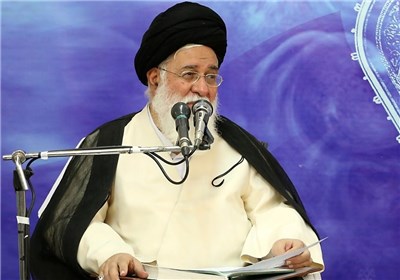
RNA - In his advanced Fiqh classes in the Islamic Seminary, Ayatollah Alam al-Huda, said: "When we conclude that sovereignty belongs solely to Allah and His representatives the Holy Infallibles, the question arises whether - now that we do not have access to an Infallible Imam - the Islamic Jurisprudent (who has been introduced by the Infallibles as a source of emulation for the people), can establish a government?"
By pointing out that the formation of an Islamic Government requires an uprising, he stated: "If the Infallibles themselves were to establish an Islamic Government, they would have to have led an uprising."
"Evidence exists which may allude to the prohibition of uprisings during the time of the major occultation, however these apparent evidences have been debated and can be answered," he said.
"Some people want to claim that the theory of Wilayah al-Faqih is no more than 200 years old and was proposed during the time of the late Mullah Naraqi, while others claim it was first brought up during the Safawid empire. We however, believe that the theory of Wilayah al-Faqih was first introduced during the lifetimes of the Infallible Imams and was spread amongst their companions."
He further explained that: "In the actions of the Infallible Imams before the birth of Imam al-Mahdi, the issue of leadership and the authority of the Islamic jurists was raised, and the Infallibles would issue authority to their own representatives. This topic has precedent even before the advent of the minor occultation and the emergence of the first generation of Islamic jurists such as Sheikh al-Mufeed and Sayyid Murtadha."
Ayatollah Alam al-Huda further mentioned that in the period of the major occultation, the theory of Wilayah al-Faqih must be proven using the Holy Quran, the authentic Prophetic traditions, the intellect, and the consensus of the scholars; while he also maintained the primacy of intellectual evidence for the theory of Wilayah al-Faqih.
111/115